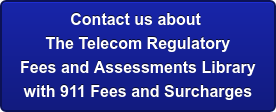
Today: US Congress Inmate Calling Service Legislation, FCC LNPA Transition Outreach, FCC Registry of Intermediate Carriers, Energy and Commerce Committee on Daylight Savings Time
US Congress Inmate Calling Service Legislation
U.S. Senators Tammy Duckworth (D-IL), Rob Portman (R-OH), Cory Booker (D-NJ) and Brian Schatz (D-HI) introduced S2520, the Inmate Calling Technical Corrections Act to clarify the FCC’s jurisdiction over intrastate inmate calling service rates and video visitation. ·Among other things, the legislation:
- Ensures consumers receive just and reasonable charges for all intra- and interstate inmate calling, drawing on the existing standard in Section 202 of the Communications Act.
- Ensures just and reasonable rates apply regardless of technology used, like video visitation services and other advanced communications services. This also ensures that the needs of inmates with disabilities is addressed.
- Permits the FCC to use its traditional procedures and authority to address unjust and unreasonable inmate calling rates.
Supporters describe the bill as “future-proof” because it “makes clear that the obligations of fairness and just and reasonable rates apply to all inmate communications regardless of technology used, like video visitation services and other advanced communications services.”
FCC Commissioner Clyburn welcomed the introduction of the legislation, saying: “For far too long inmates and their loved ones have suffered under the burden of egregious inmate calling and video visitation rates. I commend Senators Duckworth, Portman, Booker, and Schatz for their work on the Inmate Calling Technical Corrections Act of 2018, which would clarify the FCC’s authority to tackle this problem in a comprehensive manner and establish a timeline for doing so. I look forward to the day where we can truly say that inmate calling rates across the nation are just and reasonable.”
FCC LNPA Transition Outreach
The FCC’s Wireline Competition Bureau announced that the 26th Local Number Portability Administrator (LNPA) Transition Outreach and Education Plan (TOEP) webcast will be held on March 14, 2018 at 3:00 PM ET. It will be hosted by Price Waterhouse Coopers, LLP, the Transition Oversight Manager (TOM) for the LNPA transition. The objectives for the TOEP webcasts are to provide transparent communications regarding the LNPA Transition; serve as an open forum to gather and understand needs and concerns; and incorporate feedback to improve future communications. Materials from prior TOEP sessions as well as other LNPA transition reference documents are available here.
FCC Registry of Intermediate Carriers
A new federal law will require the FCC to establish a publicly available registry of intermediate providers and will prohibit covered providers from taking service from an unregistered intermediate provider. Intermediate providers will also be required to follow service quality standards to be developed by the FCC within the next year. The requirements will apply to any intermediate provider that offers or holds itself out as offering the capability to transmit covered voice communications from one destination to another and that charges a rate for such transmission to any other entity, including an affiliated entity.
Are you looking for more detailed information on this development? Learn more about Inteserra's Briefing Service and about our FCC Briefing dated 3/6/18. If you already subscribe, see the Briefing dated 3/6/18.
By-The-Way . . .
Energy and Commerce Committee on Daylight Saving Time
The Energy and Commerce Committee sent a letter on today to the Department of Transportation (DOT) to get some answers regarding the necessity of changing to Daylight Savings Time (DST). The Committee raises questions to the department about the costs and benefits associated with the biannual change between DST and Standard Time. American's should know if there is updated research on the impacts of the time change, positive or negative, on traffic, energy consumption, consumer activity, or any other economically relevant factor.
And we miss the hour of sleep.
________________________________
The Regulatory Mix, Inteserra’s daily blog of telecom related regulatory activities, is a snapshot of PUC, FCC, legislative, and occasionally court issues that our regulatory monitoring team uncovers each day. Depending on their significance, some items may be the subject of an Inteserra Briefing.




